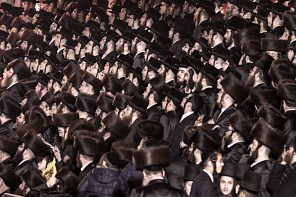If Scientists are the West’s last priestly class then Freeman Dyson might be our greatest heretic. Nicholas Dawidoff’s profile of the brilliant physicist in the New York Times Magazine illuminates a man who has always sought to subvert scientific consensus—most recently in denying the dangers of climate change and CO2 emissions. The story’s title, “The Civil Heretic,” signals the ghost of religion hanging in the background.
It is the “secular religion of environmentalism” that Dyson opposes. A religion that holds the plant itself sacred, condemns the sins of carbon emissions, preaches the doctrines of climate change and warns of the global tribulation complete with famine, floods, and death. It has its great preacher, Al Gore, the George Whitefield of the Great Envrio-wakening and its Edwardian theologian in NASA’s James Hansen, Gore’s advisor on An Inconvenient Truth. It’s this sacred character of environmentalism that Dyson finds problematic. He admits they may be right—but, it isn’t science, it’s an ideology.
But even Dyson’s views on science and the universe seem to smack of the sacred. Dawidoff writes, “Dyson has said he believes that the truths of science are so profoundly concealed that the only thing we can really be sure of is that much of what we expect to happen won’t come to pass.” Dyson seems to be both a skeptic and an esoteric. Skeptical of the computer models that offer the divine word on climate change. But esoteric in his belief that there is a hidden knowledge in the depths of science, a gnosis, that the Inconvenient Truth-thumping Greens are too excited to look for.
To find Dyson’s confidence in the face of global change naïve would be to miss the point. It’s not that the planet is not important to Dyson, it’s that there are more important and solvable global problems: nuclear arms, poverty, overfishing, and species extinction to name a few. And so we find the final sacrament in the story. Humanity. More than a heretic, an esoteric, or a skeptic (or any other –ic we might apply) Dyson is a humanist. This brings us back to ideology. For Dyson, for Gore, for Hansen and for all of us invested in protecting the planet and life on it, it isn’t about the science. It’s about the ideology.
Though I completely disagree with Dyson on the issue of climate change he does bring out a salient point about the role of Science in our current culture. It is driven by ideology as much as religion. Science has its own sacred character. This is not a new claim but Dyson offers an important reminder. Richard Dawkins and other scientists who have sought to use science to pull the rug out from under theism and religion fail to see their own rug.
In The Presence of Myth, Polish philosopher Leszek Kolakowski argues that in an indifferent and contingent universe no value can be attributed to anything (natural selection, survival, scripture, ritual) without relying upon “myth.” I would substitute “the sacred” for his “myth” but the point remains. The fact that we find climate change a problem is based upon a series of sacred values that are not empirically apparent but rather sacredly assumed. We assume that the maintenance of the planet is a valuable (=good) thing. We assume that floods and famines are bad things (a negative value). We assume that our own survival is valuable (=good). And while I agree that maintenance of the planet, avoidance of flood and famine, and human survival are all good things and we should do our best in securing them, I can only do so by giving them a value—a value not derived from the contingent and indifferent world but derived from my own sacred ideology. From what Paul Tillich called my “ultimate concern.”
When science moves from observation and description of the planet to assigning value to phenomena; when it moves from scientific observation to environmental activism it draws on a set of “ultimate concerns”—on the sacred. Freeman Dyson reminds us that we all, scientist or not, hold something of value and so the dispute between the climate change advocates and deniers is not about “the science” or “the evidence.” It’s about the sacred.




